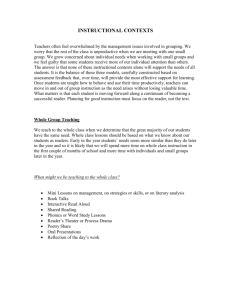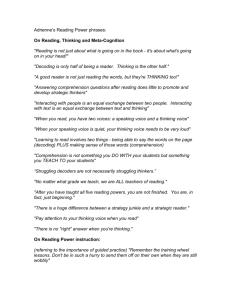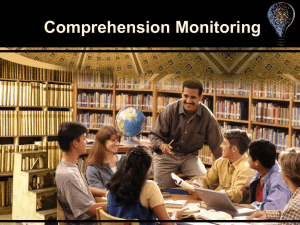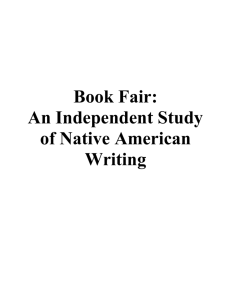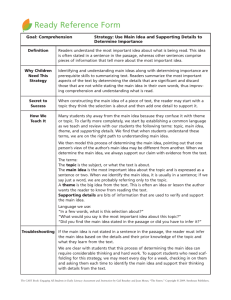Perspectives on Text Complexity in 2011
advertisement
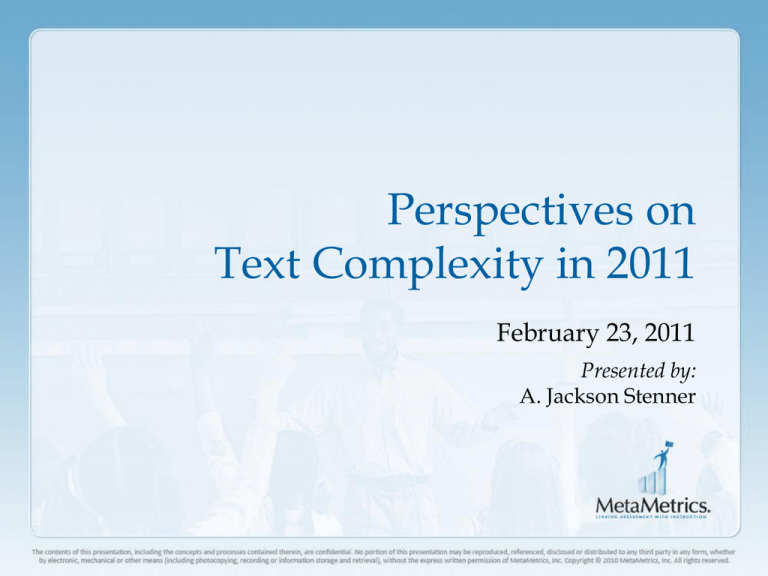
Perspectives on Text Complexity in 2011 February 23, 2011 Presented by: A. Jackson Stenner Overview Introduction to MetaMetrics and the Frameworks Text Complexity, Reader Ability, and Comprehension Rates Text Complexity Continuum Dimensionality of Reading How Well Does the Lexile Theory Work? Free Resources for Educators 2 Introduction to MetaMetrics Founded in 1984 as an organization focused on psychometric research and development Research funded by five grants from NIH Introduced The Lexile Framework® for Reading in 1997 Introduced The Quantile Framework® for Mathematics in 2005 Introduced The Lexile Framework® for Writing in 2006 3 Features and Benefits of Our Frameworks Measurement Properties – Vertical Scale – Common Supplemental Scale – Focus on Individual Student Growth K-16 – Connects the Day-to-Day with the Year-to-Year Metric is Instrument-Independent Instructional Properties – Differentiated Instruction – Links Assessment/Instruction – Educator, Parent, and Student Actionable 4 Reading is a process in which information from the text and the knowledge possessed by the reader act together to produce meaning. Anderson, R.C., Hiebert, E.H., Scott, J.A., & Wilkinson, I.A.G. (1985) Becoming a nation of readers: The report of the Commission on Reading Urbana, IL: University of Illinois 5 The Lexile Framework for Reading A causal model relating reader ability, text complexity and comprehension Measures reader ability and text complexity on a common scale—the Lexile scale Allows educators to forecast the level of comprehension a reader is likely to experience with a particular text 6 An Equation Conceptual = Comprehension Reader Ability - Text Complexity Statistical Raw Score = Σi e (RA – TC i ) 1 + e(RA – TC ) i RA = Reader Ability TC = Text Complexity 7 Comprehension Rates for Fixed Text Complexity Comprehension Rates for Readers of Different Ability with Texts of the Same Complexity or How Reader Ability and Comprehension Rate Relate Under Constant Text Complexity Reader Ability Classroom Textbook Comprehension Rates 500L 750L 1000L 1250L 1500L 1000L 1000L 1000L 1000L 1000L 25% 50% 75% 90% 96% 8 Comprehension Rates for Fixed Reader Ability Comprehension Rates for Readers of the Same Ability with Texts of Different Complexity or How Reader Ability and Comprehension Rate Relate Under Varying Text Complexity Reader Ability Text Complexity Text Titles Comprehension Rates 1000L 500L The Magic School Bus, Inside the Earth (Cole) 96% 1000L 750L The Martian Chronicles (Bradbury) 90% 1000L 1000L The Reader’s Digest 75% 1000L 1250L The Call of the Wild (London) 50% 1000L 1500L On Equality Among Mankind (Rousseau) 25% 9 Text Complexity Continuum Williamson, G.L. (2008). A text readability continuum for post-secondary readiness. Journal of Advanced Academics, 19(4), 602-632. 10 Observed vs. Aspirational Text Complexity Stenner, A.J., Koons, H., Swartz, C.W. (2009). Closing the text complexity gap: Reconceptualizing the text curve. 11 Text Continuum by Content Area 1400 1200 Lexile Measure 1000 Health 800 Language Arts Literature Mathematics 600 Science Social Studies 400 200 0 Grade 1 Grade 2 Grade 3 Grade 4 Grade 5 Grade 6 Grade 7 Grade 8 Grade 9 Grade 10 Grade 11 Grade 12 12 Distribution of Text Readability Measures for the Texas Higher Education Coordinating Board (Box Plots: min, 25th, 50th, 75th, max) 1600 1600 1500 1500 1400 1400 Lexile Measure Commended = 1490L 1300 1300 1200 1200 1100 1100 THECB = 1170L 1000 1000 Standard = 1015L 900 900 800 800 700 700 Community/Techncial College (N=37) Community College (N=48) Four-Year (N=52) All (N=137) Commissioned by the Texas Higher Education Coordinating Board www.thecb.state.tx.us/collegereadiness/MetaMetrics-Technical-Report-Update.pdf 13 Consistency Across States Cut Points – Commended/Advanced – 1490L, 1475L, 1460L – College Ready – 1170L, 1200L, 1215L – Standard/Basic – 1015L, 960L, 980L Text Distributions 14 Text View Vs Reader View 15 16 17 Figure 1: Plot of Theoretical Text Complexity versus Empirical Text Complexity for 475 articles “Mythology” Reliability = .996 SEM = 12L r = 0.952 r” = 0.960 R2” = 0.921 RMSE” = 99.8L 18 Oasis: Usage Report by Grade 19 Oasis: Usage Report by Reader Lexile 20 Oasis: Usage Report By Category of Article 21 Contact: A. Jackson Stenner jstenner@Lexile.com 22
